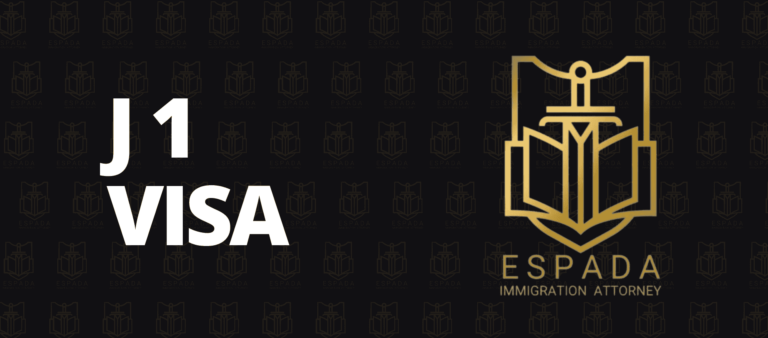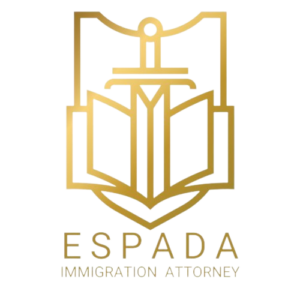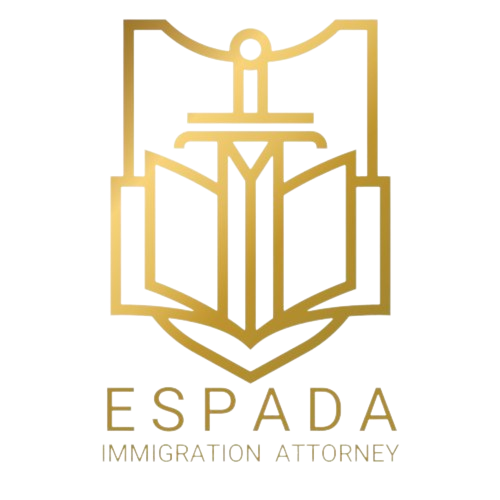J1 Visa Comprehensive Guide : All You Need to Know
J1 Visa Comprehensive Guide : All You Need to Know

- Au pair
- Camp counselor
- College or university student
- Government visitor
- Intern
- International visitor
- Physician
- Professor
- Research scholar
- Secondary school student
- Short-term scholar
- Specialist
- Summer work travel
- Teacher
- Trainee
In this comprehensive guide, I will outline all the essential details about the J1 visa. If you have any questions, feel free to email me directly at abbas@espadaimmigration.com. I’m highly responsive and happy to assist you.
Overview:
What is the J1 visa?
Benefits of the J1 Visa
What programs are available under the J1 visa?
What are the requirements for a J1 Visa?
What is the role of the sponsor?
J1 Visa Process
What documents are required to get a J1 Visa?
J1 Visa Processing Time
J1 Visa Fees
Special J1 Programs
Two-Year Home Residence Requirement
Conclusion
1. What is the J1 Visa?
The J1 visa is a non-immigrant visa that enables foreign nationals to travel to the United States as exchange visitors. This program covers a wide variety of activities, including participation as an au pair, camp counselor, college or university student, government visitor, intern, international visitor, physician, professor, research scholar, secondary school student, short-term scholar, specialist, summer work travel participant, teacher, or trainee. Consulting with an immigration lawyer can help determine whether the J1 visa is the right option for your specific goals.
2. Benefits of the J1 Visa
The J1 visa offers a range of benefits that make it an appealing option for many individuals:
Gain Professional and Cultural Experience
The J1 visa provides an excellent opportunity for foreign nationals to work in various fields in the United States. Participants can enhance their English language skills, gain valuable professional experience, and immerse themselves in American culture, all while developing career-relevant competencies.
Bring Your Family
Most J1 visa categories allow dependents, including spouses and unmarried children under 21, to accompany the primary visa holder under J2 visa status. J2 visa holders may apply for an Employment Authorization Document to work in the U.S. However, some categories—such as au pairs, camp counselors, secondary school students, and summer work travel participants—do not permit dependents to join.
Diverse Program Options
The J1 visa encompasses 15 distinct categories, each tailored to specific professions, goals, or activities. Unlike other visa types that might restrict eligibility to certain nationalities or roles, the J1 visa offers flexibility and a broad scope of opportunities.
3. What Programs Are Available Under the J1 Visa?
The J1 visa includes 15 unique programs. Below are the categories and their requirements:
Au Pairs
Au pairs live with an American family, provide childcare for at least 12 months, and may extend their stay for an additional 12 months. They receive a stipend, room, and board and must complete at least six hours of academic credit at a U.S. university.
Requirements:
- Secure a job offer from a family.
- Be 18–26 years old, in good health, and with prior childcare experience.
- Have a secondary school education, English proficiency, and an international driver’s license.
- Pass a police clearance report.
Camp Counselors
Camp counselors work at U.S. summer camps for up to four months. While they receive housing, food, and wages, they cannot hold staff positions like cooks or janitors.
Requirements:
- Be at least 18 years old.
- Have experience working with children.
- Speak and understand English.
College and University Students
This program allows students to engage in academic programs in the U.S. for up to 24 months, distinct from the F1 visa, which is meant for full-time academic pursuits.
Requirements:
- Obtain sufficient funding for the program.
- Be enrolled full-time in a program recognized by a formal agreement between U.S. and foreign educational institutions or governments.
Government Visitors
This category is for international dignitaries and influential individuals to foster relationships and participate in official events.
Requirements:
- Be selected by a U.S. federal, state, or local government agency.
- Hold a distinguished or influential position.
International Visitors
Focused on people-to-people exchanges, this program promotes collaboration and training with U.S. organizations for up to one year.
Requirements:
- Be a leader in a specialized field.
- Be selected by the U.S. Department of State.
Physicians
Physicians can participate in graduate medical training programs at accredited U.S. institutions, focusing on research, teaching, and consultation, excluding direct patient care.
Requirements:
- Demonstrate program acceptance through signed agreements.
- Show English proficiency and pass required medical exams.
- Provide a statement from their home government indicating the need for training and intent to return home.
Professors and Research Scholars
These categories enable international scholars to exchange ideas, teach, or conduct research in the U.S.
Requirements:
- Not pursue tenure-track positions or repeat similar J1 programs within 24 months.
- Avoid prior J1 program participation within the last 12 months unless meeting specific exceptions.
Secondary School Students
Students can attend U.S. high schools, engage in extracurricular activities, and live with host families or at boarding schools.
Requirements:
- Be 15–18 years old.
- Have completed no more than 11 years of primary and secondary education.
- Not have participated in a similar exchange program before.
Short-Term Scholars
This program allows foreign scholars to visit the U.S. for up to six months to lecture, train, or collaborate.
Requirements:
- Be a professor, researcher, or hold similar qualifications.
Specialists
Specialists in specific fields can visit the U.S. for up to one year to consult or provide demonstrations.
Requirements:
- Be an expert in a specialized field.
- Not fill permanent roles or participate in other J1 programs.
Summer Work Travel
College students can work and travel in the U.S. temporarily during their summer break, fostering cultural exchange.
Requirements:
- Be a full-time post-secondary student outside the U.S.
- Speak English fluently.
- Secure job placement before arrival (unless from a visa waiver country).
Teachers
Primary and secondary teachers can work in U.S. schools for up to three years, with the possibility of a two-year extension.
Requirements:
- Possess a degree equivalent to a U.S. bachelor’s degree.
- Have two years of teaching experience and meet U.S. state licensing requirements.
- Demonstrate English proficiency.
Trainees and Interns
Structured training programs allow participants to gain hands-on experience in their fields. Training can last up to 18 months, while internships and agriculture programs are limited to 12 months.
Requirements for Interns:
- Be enrolled in a foreign post-secondary institution or have graduated within the last 12 months.
Requirements for Trainees:
- Hold a foreign degree and one year of work experience or have five years of experience in the field.
These diverse programs make the J1 visa a versatile choice for gaining cultural, academic, and professional experiences in the U.S.
4. What Are the Requirements for the J1 Visa?
Proof of Qualifications as a Foreign National
To qualify for a J1 visa, you must be a foreign national with a valid passport. Additionally, you need to provide documentation proving your educational background and/or relevant work experience.
Financial Means to Cover Expenses
J1 visa applicants must demonstrate they have the financial resources to cover transportation, housing, and daily living expenses while in the United States. Some programs may offer stipends, but J1 visa holders are not allowed to engage in employment outside of their designated program.
Demonstrating Nonimmigrant Intent
Applicants must prove their intention to return to their home country after completing their program. Evidence could include property deeds, lease agreements, documentation of future employment, or family ties, among other forms of proof.
Assurance of Not Displacing U.S. Workers
The J1 program must not negatively affect employment opportunities for American workers. This requirement ensures that businesses use the program to supplement, not replace, their existing workforce.
Sponsorship Requirement
A sponsor is necessary to approve and oversee your participation in the program. The sponsor is responsible for ensuring that the program complies with J1 visa regulations and supports your role in the U.S.
5. What Is the Role of a Sponsor?
A J1 visa sponsor is an essential part of the process. They approve your program and oversee your participation. Although sponsors may not interact directly with visa holders, they are responsible for ensuring compliance with all program requirements and for monitoring third parties, such as host organizations. Sponsors ensure the program aligns with J1 regulations, assist in the hiring process, update the SEVIS system if any changes occur, and ensure that all parties fulfill their responsibilities.
6. J1 Visa Process
The J1 visa application process involves several steps, which may vary depending on your sponsor and program. Here is an overview of the process:
- Find a J1 Sponsor
- Apply for the Form DS-2019
- Complete Form DS-160
- Pay Applicable Fees
- Attend an Interview at a U.S. Embassy or Consulate
- Request Form I-94 and an Endorsed DS-2019
Finding a J1 Sponsor
A sponsor is a prerequisite for obtaining a J1 visa. They provide the opportunity for you to participate in a U.S.-based program. You must submit documentation to your sponsor to demonstrate your qualifications. For a full list of sponsors, refer to official government resources.
Applying for Form DS-2019
The DS-2019, or Certificate of Eligibility for Exchange Visitor (J1) Status, includes details about your program, biographical information, and financial situation. It is processed through the SEVIS system, allowing U.S. agencies to monitor your immigration status.
Completing Form DS-160
This online Nonimmigrant Visa Application is mandatory for anyone applying for a J1 visa.
Paying Fees
Applicants must pay the SEVIS and visa application fees before attending their consular interview. Receipts should be retained as proof of payment.
Consular Interview
Even with a sponsor’s approval, the J1 visa is not guaranteed. Applicants must attend an interview at a U.S. consulate or embassy and present documentation supporting their eligibility for the visa.
Obtaining Form I-94 and Endorsed DS-2019
Upon visa approval, applicants receive an I-94 and a DS-2019 form endorsed by their sponsor. These documents confirm legal status under the J1 program. Sponsors must be informed of any changes in name, address, or program status.
7. What Documents Are Required to Get a J1 Visa?
The exact documents required may vary based on your sponsor and program. Here is a general list:
- Form DS-7002: Training/Internship Placement Plan outlining program goals, skills, and evaluation methods.
- Third-Party Agreement: A signed agreement between the sponsor and any involved third-party organization.
- Passport Copy: Biographic page(s) of passports for you and dependents, valid for at least six months beyond the program’s duration.
- Resume: A copy of your professional resume or CV.
- Educational Documents: Certified copies and translations of academic credentials.
- Experience Letters: Confirmation letters detailing relevant work experience, with translations.
- Application Fee: A check or receipt for the required application fee.
- Proof of Enrollment: Documentation confirming enrollment in a foreign educational institution, if applicable.
- Health Insurance Confirmation: Evidence of required health insurance coverage during the program.
- Financial Support Proof: Budget or bank statements proving sufficient funds to cover your stay.
- Offer Letter: A letter from the host organization detailing the program and your role.
- Host Organization Details: Basic information about the host and the nature of the program.
- English Proficiency Proof: Documentation showing adequate English language skills.
- Sufficient Financial Resources: Evidence of financial capability to sustain yourself throughout the program.
An immigration lawyer can help you gather and verify these documents to ensure a smooth application process.
8. J1 Visa Processing Time
The time required to process a J1 visa depends on several factors, including the host organization you are working with, the processing timelines of the U.S. consulate, and the time of year you submit your application. Consulting an immigration attorney familiar with your specific circumstances can help provide more detailed and accurate information.
9. J1 Visa Fees
As of the time this guide was written, the fees associated with the J1 visa are as follows. These fees may change, so it is advisable to verify the most current costs:
- Visa Processing Fee: $160
- SEVIS Fee: $180 (some sponsors or host organizations may cover this cost)
- Additional Costs: These include transportation, insurance, and living expenses, which can vary depending on the applicant’s country and individual situation.
10. J1 Special Programs
There are several unique programs under the J1 visa category. Below are two examples:
Korean Nationals Internship Program
The Bureau of Educational and Cultural Affairs created the Work, English, Study, Travel (WEST) program, which enables Korean university students and recent graduates to spend up to 18 months in the United States. Participants can study English, complete internships, and travel. This program offers valuable opportunities to gain insight into business practices and procedures. Host organizations can include employers, nonprofits, or academic institutions.
Eligibility requirements include:
- Citizenship in South Korea.
- Approval from the South Korean government.
- Enrollment in or graduation from a university within the past 12 months.
- Proof of financial resources.
- No dependents accompanying you.
For further details about the WEST Program, visit the official program website.
Irish Nationals Internship Program
The Department of State established the Intern Work and Travel (IWT) Program for Irish nationals. This program allows participants to spend 12 months in the United States to engage in internships and travel.
Eligibility requirements include:
- Citizenship in Ireland.
- Enrollment in or graduation from a university within the past 12 months.
- Proof of financial resources.
- No dependents accompanying you.
Unlike other programs, pre-approval of an internship placement is not required for participation in the IWT program.
11. Two-Year Home Residence Requirement
Certain J1 visa holders and their dependents must return to their home country for a minimum of two years after completing their program. This requirement may also apply to individuals seeking a new visa status.
In some cases, participants can request a waiver of the two-year home residence requirement. Grounds for such a waiver may include demonstrating significant negative impact or facing persecution upon return to the home country. An immigration attorney can help evaluate whether you are subject to this requirement and assist in determining your eligibility for a waiver.
12. Conclusion
The J1 visa allows international participants to visit the United States as exchange visitors. It supports various programs, including roles as au pairs, camp counselors, college or university students, government visitors, interns, international visitors, physicians, professors, research scholars, secondary school students, short-term scholars, specialists, summer work travel participants, teachers, and trainees.
With this guide, you should now have a clearer understanding of the J1 visa’s benefits, requirements, and application process.
If you have any questions about the topics covered in this guide, feel free to email me directly at abbas@espadaimmigration.com. As an experienced U.S. immigration lawyer, I’m highly responsive and happy to assist you.
Resources
- Business Immigration Law & Practice: Second Edition
- Exchange Visitor Program (j1visa.state.gov)
Why Choose Us
Choosing the right immigration lawyer can make all the difference in achieving your U.S. immigration goals. At Espada Immigration Lawyer, we are dedicated to providing exceptional legal guidance and personalized support through every step of the process. Our team combines specialized expertise, transparency, and an unwavering commitment to client success, making us a trusted partner for all your immigration needs.
- Specialized Expertise
- Personalized Approach
- Transparent Guidance
- Client-Centered Commitment

DISCLAIMER: This article is provided for general informational purposes only and does not constitute legal advice. The information herein should not be interpreted as formal legal counsel nor does it establish an attorney-client relationship. This article is neither intended as a solicitation for legal services nor as a substitute for individual legal advice. For specific legal guidance, please consult an attorney in your jurisdiction. Actions based on information in this article are taken at your own risk, and I disclaim any liability for such actions. Please note that information may have changed since publication and may no longer be current. This article does not offer guarantees, warranties, or predictions regarding the outcome of any legal matters. Each case is unique, and results will depend on individual facts and legal issues. Thank you.
ATTORNEY ADVERTISING: Any invitation to contact our law firm on this website and related pages constitutes attorney advertising.
